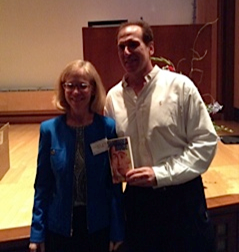By CYNTHIA M. BULIK, PhD
Published: October 7, 2013
There is no better way to learn about recovery than from someone who is going through it. I had the honor of spending time with Brian Cuban when he graced us with his presence at the 10th Anniversary Symposium for the Center of Excellence for Eating Disorders. Brian personified several of the tenets that I wrote about in Midlife Eating Disorders, but one that really struck me as we talked was that he was indeed practicing radical honesty. As he said, once he stepped across that line toward seeking help, it all just came out…and it is still coming out. In fact, one of the truths he shared was that memories that he had packed deep away continue to come back to him—sometimes triggered by a place, sometimes by a completely unrelated story. But those memories remind him that recovery is a process and there’s always more construction to do as he pieces his recovery story together.
The most touching moment of a truly inspirational talk was when he described how he responds when someone asks him if he is cured. He shared that at times he still has urges and at times he still has “goofy” thoughts when he looks in the mirror. But then came the poetry. He said, “I’m not engaging in the behavior and I am living a life that I never would have dreamed of when I was going through those behaviors…of accomplishments…and relationships…and love. You know, learning how to let people in, learning how to love people and learning how to accept love and drop that wall. To me, that’s cured.”
Everyone in the room felt that in their gut and in their heart. Sure, we have plenty of clinical definitions of remission, recovery, relapse, and even cure. What Brian gave us was a human definition—one rooted in interpersonal relationships, giving and receiving, and working hard to solidify a sense of self and identity that is true to who you are in the world.
Like he said, especially since he started his recovery journey late in life, having been bulimic for 27 years and suffering from body dysmorphic disorder, depression, drug, alcohol, and steroid abuse, he’s probably always going to have the thoughts, but how he responds to them is different. That’s such a great pearl of recovery wisdom. Patients will often ask me whether the eating disorder thoughts will ever go away. For some people, they do. For others, they might stick around, but when you recover, they have less power over you and you learn how to respond to them differently. That’s why I loved that he called those occasional thoughts when he looks into the mirror “goofy.” It’s such a little word, but it actually conveyed a wealth of meaning. When you are in the throes of body dysmorphic disorder or an eating disorder, you could never use that word to describe your distorted thoughts. The thoughts feel real, raw, and painful. As you recover, and are able to distance yourself from them, you hear them as they pass through your head, but you can take a step back, judge them for what they are, and manage them before they manage you.
Family is what pulled him out of the whirlpool of despair that almost took his life. Thanks to those family and relationship bonds, and the inner strength that Brian found to recover, he’s here to tell his story. He’s here to bust stereotypes and to speak out about topics that lots of men and boys are too ashamed to discuss. There is nothing shameful about a boy or a man having an eating disorder or body dysmorphic disorder, just like there is nothing shameful about a boy or a man having diabetes or allergies. Culture has just made us think that there’s a difference. Brian is doing his best to change that.
It takes courage to stand up and share your recovery story. The reward lies in every boy or man who reaches out for help because Brian said it was OK.
Check out Brian Cuban’s book Shattered Image. For resources for men with eating disorders see N.A.M.E.D. and Men Get Eating Disorders Too.
